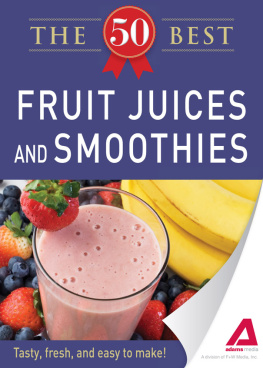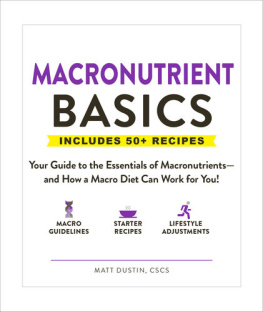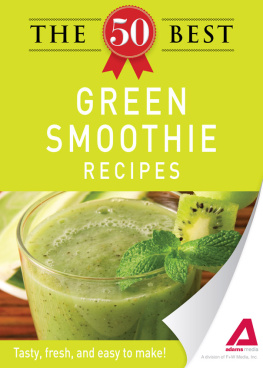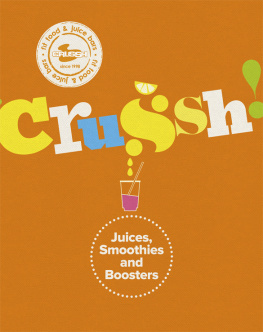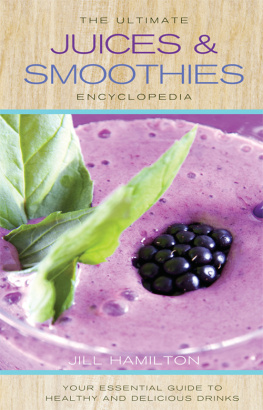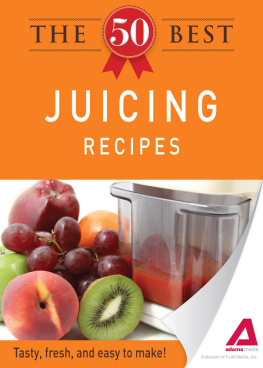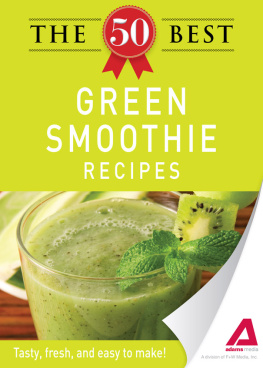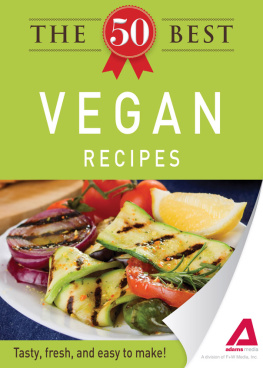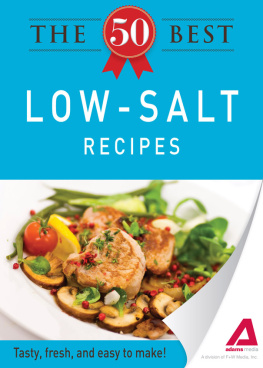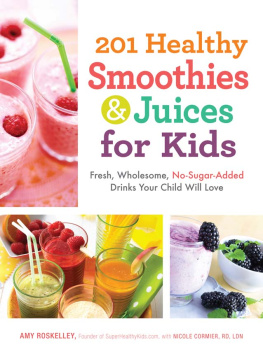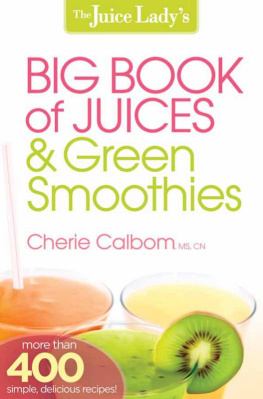The Best of Everything
Fruit Juices and Smoothies
Tasty, Fresh, and Easy to Make!
Adams Media, a division of F+W Media, Inc.
Avon, Massachusetts
Contents
Introduction
Juicing is an easy and convenient way to consume your daily quota of fruits and vegetables, assimilate vital nutrients more rapidly, hydrate your body, and enjoy a steady stream of energy all without growing your own organic farm or taking fistfuls of supplements every day. During the juicing process, the cell walls of the fruits and vegetables are sliced open to release a cornucopia of nutrients including amino acids, chlorophyll, enzymes, minerals, and vitamins all of which are quickly absorbed by the body once the juice is consumed. Today, thanks to the advent of high-tech juicers that make juicing easier, faster, and more fun, juicing has never been more popular. Millions of people have turned to juicing to ward off everyday disorders like colds and migraines, promote longevity, shed excess pounds, enhance memory, reduce stress, treat skin diseases, develop more beautiful and lustrous hair, build stronger nails, and prevent and treat a host of conditions and diseases.
Best Juicing Fruits
Fruits, whether they grow on trees, in the ground, or on bushes, are packed with vitamins and acids that naturally cleanse and purify the body. Called the bodys cleansers, fruits contains both simple and complex carbohydrates and release energy over an extended period of time.
Fresh fruits are also great stores of solar energy, ripening more slowly than most other foods and soaking up large sources of vitamin C, which strengthens the immune system, helps ward off infection, and builds strong bones, teeth, and nails.
Focus on Citric Acid
The acids in fruits are what give them their tart, or puckery, flavor. Citric acid is found most abundantly in lemons and other citrus fruit, including lime, grapefruit, orange, cranberry, strawberry, raspberry, pineapple, peach, and tomato. Acids scour away strong bacteria and waste in the bodys tissues and facilitate healing.
Enzymes in Fruits
All fruits contain powerful enzymes that have powerful antibacterial qualities. Enzymes help cleanse the gastrointestinal system by digesting and neutralizing excess protein and fat.
If consumed regularly, fruit enzymes can also help flush out the tissues, organs, and muscles by ridding them of these same excesses.
The Fluid Connection
In addition to acids and enzymes, fruits also provide a highly purified source of liquids to the body. This helps dilute acidity and build strong bones and teeth.
Fruits of the Tree
Tree fruits are as American as apple pie and are a highly versatile player in juicing, contributing a wide range of flavors, colors, and textures. Here are some of the most popular fruits:
- Apples. Rich in vitamins A, B-1, B-2, B-6, C, folic acid, biotin, and a host of minerals that promote healthy skin, hair, and nails, apples also contain pectin, a fiber that absorbs toxins, stimulates digestion, and helps reduce cholesterol.
Apples are extremely versatile and blend well with other juices. Yield per pound: six to eight ounces of juice.
- Apricots. Apricots are high in beta-carotene and vitamin A and are a good source of fiber and potassium. Yield per pound: six ounces of juice.
- Cherries. Rich in vitamins A, B, C, folic acid, niacin, and minerals, cherries are potent alkalizers that reduce the acidity of the blood, making them effective in reducing gout, arthritis, and prostate disorders. Yield per pound of pitted cherries: six to eight ounces of juice.
- Grapefruit.
Rich in vitamin C, calcium, phosphorous, and potassium, the pink and red varieties of grapefruit are sweeter and less acidic than white grapefruit. Grapefruit helps strengthen capillary walls, heal bruising, and reduce skin colds, ear disorders, fever, indigestion, scurvy, varicose veins, obesity, and morning sickness. Yield per pound: six to eight ounces of juice.
- Lemons. Lemons are high in citric acid and vitamin C, so a little goes a long way in juicing. Their high antioxidant content and antibacterial properties relieve colds, sore throats, and skin infections, and also help reduce anemia, blood disorders, constipation, ear disorders, gout, indigestion, scurvy, skin infections, and obesity. Yield per pound: four to five ounces of juice.
- Oranges.
A rich source of vitamins C, B, K, biotin, folic acid, amino acids, and minerals, oranges cleanse the gastrointestinal track, strengthen capillary walls, and benefit the heart and lungs. Oranges help reduce anemia, blood disorders, colds, fever, heart disease, high blood pressure, liver disorders, lung disorders, skin disorders, pneumonia, rheumatism, scurvy, and obesity. Yield per pound: six to eight ounces of juice.
- Limes. Similar to lemons in nutrients but not as acidic or cleansing, limes can be substituted for lemons in juice recipes. Yield per pound: four to five ounces of juice.
- Peaches and nectarines. High in beta-carotene and vitamin B, C, niacin and minerals, peaches and nectarines cleanse the intestines and help relieve morning sickness.
Yield per pound: one to three ounces of juice.
- Pears. Rich in fiber and vitamin C, B, folic acid, niacin, and the minerals phosphorous and calcium, pears help reduce disorders of the bladder, liver, and prostate as well as constipation. Yield per pound: four to six ounces of juice.
- Plums. High in vitamin C, A, copper, and iron, the benzoic and quinic acids in plums are effective laxatives. Plums help with anemia, constipation, and weight loss. Yield per pound: four ounces of juice.
- Grapes.
High in caffeic acid, which helps fight cancer, grapes are also packed with bioflavonoids, which help the body absorb vitamin C. Grapes also contain resveratrol, a nutrient that helps prevent liver, lung, breast, and prostate cancer, and saponins, a nutrient that binds with cholesterol and prevents the body from absorbing it. Yield per pound: eight ounces of juice.
Tropical Fruit Magic
You can find a bounty of tropical fruit in your local supermarket, even if you live in a cold climate, including:

